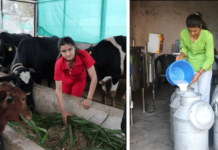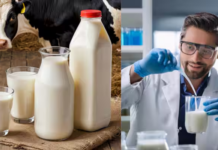The federal government should act quickly to save dairy farms in Wisconsin and New York from a trade dispute, leaders from both states are urging.
The top farm leaders in Wisconsin and New York sent the letter Friday to a top official in the U.S. Department of Agriculture urging the federal government to step in and help farmers who may go out of business because of changes in Canadian dairy policies.
The cascade reaction has put dozens of farms in Wisconsin at risk of losing a buyer for their perishable product since dairy processor Grassland Dairy Products of Greenwood will no longer be shipping to Canada. Wisconsin Agriculture Secretary Ben Brancel and New York Agriculture Commissioner Richard Ball are urging the U.S. government to help.
“If these multi-generational farm families cannot find another market for their milk, they will be forced to sell their cows and go out of business,” Brancel and Ball wrote in their letter to Michael Young, the acting U.S. deputy agriculture secretary. “We urge USDA to assist us in our efforts to help our producers by exercising its authority to purchase cheese and butter in storage and distribute it through USDA’s nutritional aid programs, including food banks and our national school programs.”
At issue is a U.S-Canada trade dispute over what’s called “ultra-filtered milk,” a protein liquid concentrate used to make cheese. Grassland said it lost its Canadian business when Canada changed its policies to give domestic farmers an edge over the U.S.
About 75 farms in Wisconsin have already been told that, in less than 30 days, Grassland will no longer buy their milk – leaving the farms without a place to ship their product in an already oversupplied market.
That’s a problem for the farmers, whose cows must be milked every day and who don’t have the capacity to store the milk being produced by their cows for more than a short period of time.
The only solution for those farmers could be to sell their cattle and shut down their farms. Milk truck drivers and others face losing their jobs as well.
The losses for the dairy industries in Wisconsin and New York alone – in not having Canada as a market for ultra-filtered milk – could run into hundreds of millions of dollars, according to the National Milk Producers Federation, an Arlington, Va., trade group. Wisconsin’s 9,200 dairy farms have nearly 1.3 million cows and support tens of thousands of other jobs and billions of dollars in economic activity.
Wisconsin Gov. Scott Walker has been pressing for changes to the Canadian policy for months, including in a June 2016 letter to then-U.S. Trade Representative Michael Froman and in a December letter to then-President-elect Donald Trump.
Dairy farmer Jennifer Sauer of Waterloo said she and her husband, Shane, are urgently seeking a processor for the milk from their 120 cows on their third-generation family farm. The April 1 letter canceling their milk contract because Grassland lost its Canadian business shook them.
“You open that envelope, and you know that your business could be gone by May,” Jennifer Sauer said last week.
Earlier, Grassland said ultra-filtered milk helped support more than 700 Wisconsin dairy farms and the company’s plant in Greenwood. For now, about 75 farms are losing their milk contracts with the company because of the new taxes, according to the farmers.

































